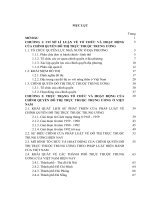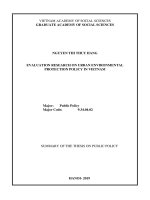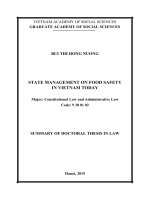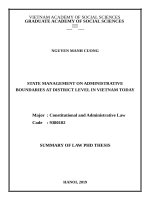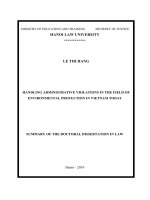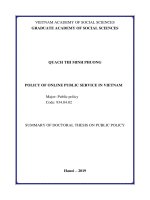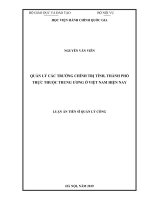Quản lý các trường chính trị tỉnh, thành phố trực thuộc trung ương ở việt nam hiện nay tt tiếng anh
Bạn đang xem bản rút gọn của tài liệu. Xem và tải ngay bản đầy đủ của tài liệu tại đây (228.29 KB, 28 trang )
MINISTRY OF EDUCATION
AND TRAINING
MINISTRY OF HOME
AFFAIRS
NATIONAL ACADEMY OF PUBLIC ADMINISTRATION
NGUYEN VAN VIEN
MANAGEMENT OF PROVINCIAL AND
MUNICIPAL POLITICAL SCHOOLS
IN VIETNAM TODAY
Major: Public management
Code: 9 34 04 03
SUMMARY OF DOCTORAL THESIS OF PUBLIC
MANAGEMENT
HANOI, 2019
The work has been completed at: NATIONAL ACADEMY OF PUPLIC
ADMINISTRATION
Supervisors: 1. Assoc. Prof. PhD. Le Thi Van Hanh
2. Assoc. Prof. PhD. Le Minh Quan
Reviewer 1: ……………………………………………………………
………………………………. …………………………… ..
Reviewer 2: ……………………………………………………………
……………………………… .. …………………………….
Reviewer 3: ……………………………………………………………
…………………………………. ………………………… ..
The thesis is presented at the Academic - level Thesis Assessment Council
Location: Meeting Hall .. ... Floor ..., National Academy of Public
Administration.
No. 77 - Nguyen Chi Thanh Street - Dong Da District - Hanoi
Time: ……… date …… month…. 2019
The thesis can be found at the National Library of Vietnam or the library of
the National Academy of Public Administration.
PREFACE
1. Reason to choose the topic
The political school is a form of training and fostering
institution of cadres and officers in Vietnam. The selection of the
topic "Management of political schools in the provinces and cities
directly under the Central Government in Vietnam today" stems from
the following reasons:
Firstly, the political school is a non-business unit attached to
the provincial and municipal party committee. The state is social
management, the political school itself performs the function of
training and fostering cadres and officers, so the state needs to
manage more closely to ensure the quality of cadres and officers.
Secondly, the political school has an important position and
role in training and fostering cadres and officers in the locality. The
quality and capacity of work is highly dependent on the quality of
operation of the political schools.
Thirdly, the management of political schools is still
inadequate, overlapping and ineffective. The political school has an
unstable process of splitting and merging; is a training and fostering
cadres and officers of the locality but it is directly under the control
of the provincial and municipal Party Committee so the management
of political schools is also complicated.
Fourthly, the theoretical basis for the management of political
schools is very limited. There are not many works and research
topics on political schools, especially from perspective management
science nowadays.
Many measures must be implemented in order to improve the
quality of training and fostering cadres and officers at political
schools, considering to the state management of political schools.
Therefore, the author chooses the thesis of "Managing the current
provincial and central political schools in Vietnam" as the research
topic for a doctoral thesis in Public Administration.
1
2. Purposes and tasks of the study
2.1 Purpose of the study
On the basis of theoretical and practical research on
management of political schools, the thesis proposes a number of
views and solutions to enhance the management of political schools
effectively and efficiently.
2.2 Tasks of the study
An overview of the research situation related to the thesis
topic to identify issues that need further study and settle. Researching
theory and practice is as a scientific basis for the thesis. Analyzing
and assessing the current situation and issues raised in the
management of political schools in Vietnam today. Proposing some
views and solutions are strengthen the state management of political
schools in the coming time.
3. Objects and scope of the study
3.1 Objects of the study
Objects of the study is state management activities for political
schools.
3.2 Scope of the study
The thesis has scope of study is 63 political schools in the
Vietnam territoty from 2008 to the present vision for the following
years.
4. Methodology and research methodology
4.1 Methodology
The thesis is based on the method of dialectical materialism
and historical materialism of Marxism-Leninism, Ho Chi Minh
thought.
4.2 Research methodology
In terms of theoretical research, there are methods of analysis,
synthesis, systematization and history; on practical research with
realistic observation methods, experts, generalizations, abstractions.
2
5. Scientific hypotheses and research questions
5.1. Scientific hypothesis
The political school has an important position and role in
improving the capacity and ethics for local cadres and officers but
the quality and efficiency of the schools are low. Because the state
management for the political school has not been focused yet, and it
is still loose and overlapping among the management agencies;
Management tools and methods are weak and lacking. If the
management of political schools is effective, it will improve the
quality and effectiveness of training and fostering cadres and officers
of political schools.
5.2. Research question
- The political school is the basis for training and fostering
institution of cadres and officers of Vietnam, what points the specific
characteristics are shown?
- Why should the government be managed the political schools
and what its contents are?
- Which can the experiences of some countries about training
and fostering institution of cadres and officers management be
applied to Vietnam's political schools management?
- What is the current situation of political schools management
in Vietnam? What are the issues that need to be solved?
- What should perspectives and solutions be implemented to
improve the effective management of political schools?
6. New contributions of the thesis
6.1. As for Theory
- Providing theoretical basis for training and fostering
institutions for cadres and officers.
- Developing a theoretical framework of training and fostering
institutions for cadres and officers management.
- Contributing some reference values in the management of
political schools in Vietnam by generalizing the experience of
3
managing training and fostering institutions for cadres and officers of
some countries in the world.
6.2. As for Practice
- Providing a panorama of the current situation of management
of political schools in Vietnam today.
- Providing views and solutions of effective state management
to political schools in Vietnam.
7. Scientific and practical significance of the thesis
7.1. As for Science
The thesis's research results contribute to supplement and
complete the theoretical basis for state management of the training
and fostering institutions for cadres and officers in general and the
political school in particular.
7.2. As for Practice
- The dissertation's findings are valuable for reference in
formulating guidelines and policies of the Party and the State relating
to the political schools activities in Vietnam now and in the future.
- The dissertation's research results are for reference to a
number of central or local agencies in directing and operating the
political school.
- The thesis can be used as a reference for researching and
teaching on public management, public policy, public administration,
etc.
8. Structure of the thesis
The thesis is divided into 4 chapters and 10 periods in
addition to the Introduction, Conclusion, Appendix and List of
references.
Chapter 1
OVERVIEW OF THE RESEARCH SITUATION
1.1. The scientific research thesis related to the dissertation
The author has consulted and evaluated a lot of scientific
research thesis. Accordingly, the author evaluates 3 scientific research
4
theses on training and fostering cadres and officers; political schools
and state management of training and fostering cadres and officers.
1.2. General comments on the research related to the thesis
From an overview of the research situation, the thesis
evaluates the achieved results, points out the issues needed to be
further studied:
Firstly, there is not a complete scholarly concept of training
and fostering institution cadres and officers. The concept of political
schools management of training and fostering cadres and officers has
not been mentioned in any scientific research theses.
Secondly, there has not been pointed out management content
for political schools in any scientific research thesis
Thirdly, political schools management is completely different
from the national education system management.
Fourthly, there has not been figured out evaluating the quality
of training and fostering institution cadres and officers any scientific
research theses.
Fifthly, there has not been found out summarizing the
practices of training and fostering institution cadres and officers
management any scientific research theses of foreign countries to
draw lessons for Vietnam's political schools management.
Sixthly, the documents and reports of the competent
authorities have not yet pointed out the existing problems, posing in
the current political schools management.
Seventhly, there has not been mentioned to the views,
solutions and measures of political schools management in any
scientific research theses.
Conclusion of chapter 1
Researching on political schools management is not pointed
out in any scientific research theses. There are some researches on
political schools, but the content of the approach has not mentioned
these schools management, which are mainly on the teaching staffs,
5
about the school models In Vietnam. However, it also provides the
author with some inheritance. However, there are still many issues
needed further study. These "gaps" is contributed to solve in this
doctoral theses.
Chapter 2
THEORETICAL BASIS FOR MANAGEMENT OF TRAINING
AND FOSTERING INSTITUTION OF CADRES AND
OFFICERS
2.1. Some general issues on the training and fostering
institution of cadres and officers
2.1.1. Concept of training and fostering institution of cadres
and officers
Training and fostering institution of cadres and officers is a
non-business unit established to organize teaching and learning
activities for people who are elected, recruited and appointed to work
in the political system of a country (people are receiving salaries
from the state budget), in order to improve the enforcement capacity
and public service ethics.
2.1.2 The characteristics of training and fostering institution
- Being a non-business unit providing public services on
training and fostering cadres and officers.
- There is a standard operating procedure.
- Creating special products and services.
- Operating is not for profit seeking.
- Only providing products and services to the state, not to
society.
2.1.3. The role of training and fostering institution of cadres
and officers
- Demonstrating the role of the state in creating public human
resources.
- Providing in-depth knowledge and skills training on
leadership, management, public service.
6
- Being a place of education and practice of public service
morals.
2.1.4. Classification of training and fostering institution of
cadres and officers
- Classification according to the political system with facilities
for training and fostering institution of cadres and officers of political
organizations, training and fostering establishments for the state
training and retraining establishments of cadres and officers of sociopolitical organizations.
- Classification by territory with central (federal) and regional
or local training and fostering institutions.
- Classification according to the field of training and retraining
with training establishments and fostering of common officers and
public employees and professional managements.
- Classification according to subjects of training and fostering
with training establishments, fostering officers and combined
establishments.
2.2. Managing training and fostering institutions for cadres
and officers
2.2.1. The concept of management of training and fostering
institution of cadres and officers
Management of training and retraining establishments for
cadres and officers is the task of managing and using the state power
with appropriate tools and forms to affect training and retraining
establishments for cadres and officers to achieve the goal of training
and fostering cadres and officers.
2.2.2. The necessity to management of training and fostering
institution of cadres and officers
- Performing the role of a manager of the state.
- Ensuring the objectives and requirements of human resources
for the state apparatus.
7
- Orientating and promoting the operation of the
administration.
2.2.3. The content of management of training and fostering
institutions for cadres and officers
- Orientating of activities of training and retraining institutions
for cadres and officers which is condition for establishment,
dissolution, division, splitting and merger; network planning of
schools; target; reorganization and usage results of training and
fostering cadres and officers.
- Supporting activities of training and retraining institutions
for cadres and officers such as build program content, build
apparatus, build human resources, provide financial and facilities.
- Controlling the activities of the training and fostering
institutions for cadres and officers. It is a quality assessment;
inspection and audit.
2.2.4. Factors affecting the management of training and
fostering institutions for cadres and officers
- Strategy of cadres and officers.
- Perfect level of legal documents.
- Collaboration among relevant management agencies.
- The quality and capacity of cadres and officers with the
training and fostering institutions for cadres and officers.
- Quality and capacity of the leader of the training and
retraining course for cadres and officers.
- Organizational culture of training and fostering institutions
for cadres and officers.
- Level of information technology applications.
2.3. Experience in managing training and fostering
institutions for cadres and officers of some countries in the world
and reference value for Vietnam
8
2.3.1. Experience in managing training and retraining
institutions for cadres and civil servants of some countries in the
world
- UK: Training institution of cadres is very diverse, including
government-owned training institution, professional training
institution and training institution at universities. The British
government applies a market mechanism, promoting competition to
manage training and fostering institution of cadres and officers. The
British Government does not invest in the development of faculty
members, but rather part-time and visiting lecturers. Content of
training cadres is often renovated, based on practical requirements of
society.
- United States: The training institution of cadres is very
diverse, there are facilities belonging to the Government managed by
the Ministry, with establishments belonging to universities. Faculty
members are professors and scholars of universities, research
institutes and experts, advisors and senior government cadres.
- Laos: Training and fostering of cadres and officers is
undertaken by the Lao National Political and Administrative
Academy, 18 provincial and provincial political and administrative
schools. Apart from these 19 establishments, there are not any
establishments with functions and tasks of training and fostering
cadres and officers. The development of programs and compilation
of textbooks, training materials and fostering of cadres and officers
are conducted by the Lao National Politics and Public
Administration but the promulgation and management are under the
authority of the Ministry of Education and Sports, signed by the
Minister of Education and Sports. Training is a form of professional
improvement for cadres and officers; fostering is an education to
improve knowledge, ability and perspective to strengthen the
performance of highly effective tasks. Fostering cadres and officers
9
includes: Orientation, fostering in-service, fostering cadres to take up
new positions.
- Japan: In addition to the government training facilities, the
provincial administrative units have their own training facilities.
Japanese cadres training institutions have the right to take the
initiative in designing and developing specific training programs as
well as other flexible programs to meet the specific requirements.
Japanese lecturers of training and fostering institutions are experts,
scholars, scientists and a number of experienced cadres of the
Government.
- France: French cadres training is performed at: National
Administration School (ENA); Regional School of Administration
(IRA); Local Training Center for Cadres (CNFPT); National Center
for Professional and Training (CNAC); Economic training center;
Education training center; Cadres training school of ministries and
private training centers. The National Administration School does
not have staffs of permanent teachers.
- China: The most responsible agency is the Central
Committee of the Communist Party of China, followed by relevant
units of the Central Committee and central and local state agencies.
Higher education institutions, scientific research centers, and forprofit training centers also participate in the training of cadres and
officers. Full-time lecturers make up a large proportion (about 80%),
part-time lecturers account for 20% of the total number of lecturers.
The training facilities for Chinese cadres and officers are oriented on
competency rather than theoretical orientation. The training content
will be more closely connected with the practical and the working
position.
2.3.2. Reference value for Vietnam
- Training and fostering institutions of cadres and officers are
organized into a system from the central to local levels.
10
- Establishment of training and fostering institutions of cadres
and officers in geographical areas and population, not necessarily
establishing training and fostering establishments of cadres and
officers according to territorial administrative units or groups
organizational structure (ministries, central agencies).
- The program of training and fostering cadres and officers is
very diverse and plentiful to suit many types of cadres and officers.
- It is not necessary to build a strong contingent of lecturers,
but it is recommended to conduct concurrent lecturers.
- Application a market mechanism to the management of
training and fostering establishments of cadres and officers.
Conclusion of chapter 2
This chapter has built up the concept of training and fostering
institutions for cadres and officers, generalized and outlined the roles
and classification of training and fostering institutions for cadres and
officers; building up the concept of managing training and fostering
institutions for cadres and officers, explaining the necessity and
content of state management over the training and fostering
establishments for cadres and officers; based on the reference of the
management of some countries in the world to the training and
fostering institutions for cadres and officers, some suggestions were
provided for Vietnam to refer.
Chapter 3
CURRENT SITUATION OF MANAGEMENT OF POLITICAL
SCHOOLS IN VIETNAM TODAY
3.1. Overview of the political school - a type of training
institution for Vietnamese cadres and officers
3.1.1. Political school in the system of training and fostering
institutions for Vietnamese officers.
In Vietnam, training and retraining institutions for cadres and
officers are diverse and plentiful with different names and types such
as academy, schools and centers.
11
The political school is a form of training and retraining of
cadres and officers in the locality, established by the Party's
competent authorities.
3.1.2. The birth and political and legal basis of political
schools
After the August Revolution in 1945, in order to build a
contingent of cadres to meet the requirements of the resistance war
of Vietnamese Revolution at that time, after the government’s
organization apparatus came into operation, Staff training in the
provinces was also conducted. From the need for cadres, a number of
the Communist Party cadre training establishments were established
in some localities, called party schools, which is the precursor of
political school today.
Because the state management activities have specific
characteristics, the contents and methods are also different from the
party building work. Meanwhile, the contingent of government
officers is very weak in administrative management capacity,
especially in the early years of the government establishment so the
administrative school was born.
The Party Central Committee's Secretariat issued Decision No.
88-QD/TW on "setting up a political school in a province or a city
directly under the central government" On September 5, 1994.
The Party Central Committee's Secretariat issued Decision No.
184-QD/TW on the functions, tasks and organizational structure of
provincial and municipal political schools on September 3, 2008.
The Party Central Committee's Secretariat issued Regulation
No. 09-QDi/TW on the functions, tasks, and organizational structure
of provincial and municipal political schools on November 13, 2018.
The Government issued Decree No. 125/2011/ND-CP
stipulating the schools of state agencies, political organizations,
socio-political organizations and People's Armed Forces. This is the
12
first legal document on the basis of training and fostering cadres and
officers, including political schools on December 30, 2011.
3.1.3. The peculiarity of the political school compared to the
training and fostering establishments for cadres and officers
- The political school is training and fostering establishment
for cadres and officers in each province/city.
- The political school is a public non-business unit that
performs political tasks.
- The political school is a school directly under the provincial
party.
- The political school carries out training and fostering
political theory and state management.
- The political school only trains and fosters the contingent of
cadres and officers.
- The political school has many subjects involved in
management.
3.1.4. Functions, duties and organizational structure of
political schools
- Functions: Organizing training and fostering of leading and
managerial officers of the grassroots political system, cadres and
officers in the locality.
- Mission:
Organizing of teaching and learning; issuing diplomas and
certificates as prescribed; researching science; summarizing practices
and research, developing theories as a scientific basis in service of
the Party's line-planning and the State's policies; taking part in
solving socio-economic, national defense-security issues of localities
and the country; taking self-determination and self-responsibility
according to the provisions of law; other duties and powers
according to decree No. 125/2011/ND-CP.
Training and fostering in leading and managerial officers of
the Party, authorities, grassroots socio-political organizations
13
(communes, townships and equivalent units); head of division,
deputy head of division and equivalent; cadres were planned for the
above titles; officers, grassroots officers and other people about
Marxism-Leninism, Ho Chi Minh thought; on the Party's guidelines
and policies, the State's policies and laws; knowledge about some
other fields according to Regulation 09-QDi/TW.
- Organizational structure:
The political school consists of principals, vice principals (or
directors, deputy directors) and functional departments, including:
faculties and specialized subjects; departments, advisory boards,
institutes, centers; units in service of training and researching science
according to Decree No. 125/2011/ND-CP.
The Political School has 05 departments and rooms:
Department of Basic Theory; Faculty of Construction Party;
Department of State and law; Department of Training Management
and
Scientific
Research;
Department
of
Organization,
Administration, Information and Documentation according to
Regulation No. 09-QDi/TW.
3.1.5. Some performance results of political schools
- Regarding training: the schools offer many types of training
courses, but mainly intermediate and political - administrative
training courses. From 2009 up to now, the political-administrative
intermediate program has opened more than 16,000 classes
(accounting for more than 40% of the total training and fostering
courses of schools).
- Regarding scientific research, from 2009 until now, the
universities have studied, accepted and put into practice 1,270
scientific research topics. Schools have organized 1,011 workshops.
61/63 schools have published newsletters, periodicals, and 01 school
has published a magazine. There are 54/63 schools that have built a
website.
14
3.2. Situation of management of political schools in
Vietnam today
3.2.1. Orientation for the operation of political schools
- Regarding the establishment, dissolution, splitting and
merging of political schools, planning of the political school
network, being a non-business unit but the establishment and
dissolution of political schools are not subject to the regulation of
Decree No. 55/2012/ND-CP dated June 28, 2012 on the
establishment, reorganization and dissolution of public non-business
units.
- Regarding the functions, tasks and organizational structure of
the political school, Decree No. 125/2011/ND-CP is not applied.
- Regarding the objective of training and fostering cadres and
officers is built by program-managing agency.
- Regarding the recognition and use of results of training and
fostering of cadres and officers, mainly through the recognition
through diplomas and certificates granted by the political schools.
3.2.2. Support for the operation of political schools
- Regarding training programs and materials:
The political school implements the programs: Intermediate
level of political - administrative theory; training leaders of division
level and equivalent; fostering and updating knowledge for deputies
to the commune, district-level People's Councils; fostering
secretaries, deputy secretaries of commune party committees, heads
of socio-political organizations in plain communes; presidents, vice
presidents of People's Councils, presidents and vice presidents of
commune People's Committees.
Regarding the management of programs implemented by the
political school, managed by the Ministry of Home Affairs and Ho
Chi Minh National Academy of Politics.
Regarding the compilation of training and fostering materials,
The agency manages the program, appraises documents, and the
15
compilation of documents is decentralized to political schools.
However, the compilation of documents is conducted by the program
management agency.
- The organizational structure
+ About the school's name: There are 60 schools called
political schools; 02 schools called staff training schools; 01 school
is called an academy.
+ Regarding the structure: There are 53 schools organized
according to the new regulations; 9 schools organized according to
the old regulations; 01 school organized specifically.
The organization of the institution is not in accordance with
the regulations because the newly issued the Regulation 09-QDi/TW
replaced the Decision No. 184-QD/TW; Party committees and local
governments have not really paid attention ; due to history, the
characteristics of each school are different; regulatory authorities are
not resolutely handling.
- The building of the contingent of political schools.
+ The school's leadership team consists of the principal and
vice principal , the school board is called by 59 schools; the board of
directors is called by 4 schools
The total leaders of 63 schools are 239 people, including 01
associate professor (accounting for 0.42%); 30 Doctor of Philosophy
(accounting for 12.55%); 160 masters (accounting for 66.95); 49
bachelors (accounting for 20.5%).
Out of 63 heads of the political school, 14 people are female
(accounting for 22.22%); there are 36 people participating in the
provincial party committee (accounting for 57.14%); 8 people are
representative of the provincial People's Council (accounting for
12.7%); 05 people are excellent teachers (accounting for 7.94%).
+ Faculty of 63 political schools is 2,162 people, male teachers
are 1,013 people (46,85%), female teachers are 1,149 people
(53,15%).
16
Regarding professional qualifications, 81 people have
doctorate degrees (3.75%); 1,526 people have a master's degree
(70.58%), which is not counting the lecturers who are pursuing
graduate and post-graduate.
Regarding the level of political theory, 100% of lecturers of
the political school have political theory level, intermediate political
theory level is 667 people (30.85%), the high level is 1,283 people
(59, 34%), political bachelor is 212 people (9.81%).
Regarding the level of state management, 100% of lecturers of
the political school have the state management qualification, the
expert level is 1,533 people (70.91%), the main expert is 573. people
(26.5%), senior experts are 56 people (2.59%).
Regarding the standards of lecturers, the state management
agency has many regulations on political school lecturers standards.
The standards were set by the Ho Chi Minh National Political
Academy by 2011 but the Ministry of the Home Affairs has
officially issued the criteria for political school lecturers in 2011.
Regarding the regime of lecturers of politics schools, they are
entitled to the regimes of salary and allowances, training and
fostering to raise their professional knowledge and skills, rested and
honors. However many benefits of lecturers are not guaranteed or
difficult to implement such as the title of excellent teacher, associate
professor and professor; the extension of the working time for Doctor
of Philosophy.
Regarding faculty management managed by the provincial
party committee (the advisory organization is the provincial party
committee).
- The financial provision and facilities construction.
In recent years, the schools have cared by managers, so the
material and technical facilities have been gradually improved
towards modernization, not only changing the face of the political
school , but also meeting the demand for civilized society in training
17
and fostering cadres and officers for the political system from the
provincial to grassroots levels. However, compared with the
requirements, it has not been as expected with the position and role
of the training and fostering school for cadres and officers.
Implementing Decree No. 16/2015/ND-CP dated February 14,
2015 of the Government, The Government is assigning autonomy
mechanism of financial management and facilities for political
schools, in reality, not 100% autonomy, but only partial autonomy.
3.2.3. Control over the operation of political schools
- Assessing the quality of training and fostering of cadres and
officers of political schools.
The Government has issued criteria and index to evaluate the
quality of training and officers of cadres and officers. The evaluation
is collecting opinions of students. For the evaluation of the
effectiveness after training, fostering is held for comments from over
06 months after course is ended by sending votes via letters, email to
students and agencies, or directly interview.
The content of evaluation includes: Assessing the quality of
the program, students; facilities quality; the course quality;
evaluating the effectiveness after training and fostering.
The quality assessment of training and fostering of cadres and
officers was first mentioned in 2014, but this activity was officially
institutionalized into the legal norm in Circular No. 10/2017/TTBNV dated December 29, 2017 of the Ministry of Home Affairs
stipulating the assessment of the quality of fostering cadres, officers.
This activity is quite new, so in fact it has not formed a pattern in
political schools.
- Inspecting and examining activities of political schools.
+ Inspection and examination of the state power, The state also
uses audit tools for financial activities of political schools. However,
it has not been conducted regularly so the results are not high.
18
+ Inspection and examination are not of state power. These are
inspections by the Provincial Party Inspection Committee and the Ho
Chi Minh National Academy of Politics.
Inspection, examination has discovered and handled many
violations in political schools, mainly financial problem. It still
limited because it is often conducted when there are signs of
violations or correspondence letters.
3.3. Assess the current situation of management of political
schools in Vietnam today
3.3.1. Results of management of political schools in Vietnam
today
Authorities have become more aware of the position, role and
importance of political schools. The documents that underlie political
school activities are becoming more complete and coherent.
Functions and duties of political schools are expressed more clearly.
The program of training and fostering cadres and officers is
relatively abundant, meeting the demand for diverse objects
according to the job positions of cadres and officers. Staffs, lecturers
of the political school system have professional quality, political
skills and work capacity. The facilities of political schools are
invested modernly, serving up the needs of training and fostering
cadres and officers.
3.3.2. Some issues raised in the management of political
schools in Vietnam today
- The law on political schools is incomplete and contradictory
to the Party's regulations.
- State management agency for political schools has not been
determined.
- Management of lecturers of political schools is still
inadequate.
- Assessing the quality of training and fostering of cadres and
officers of the political school has not been focused yet.
19
- Inspection and examination of activities of the political
school have not been strengthened.
Conclusion of chapter 3
The political school is a public non-business unit but its
establishment and operation are not governed by the Government
prescribed in the document on public non-business units, which is
stipulated by the Party Central Committee Secretariat. The political
school is managed by government and the Communist Party of
Vietnam. The political schools management is cared. Due to the
specific characteristics, effective management is still limited. There
are still many issues that need to be solved in the political schools
management.
Chapter 4
VIEWPOINTS AND SOLUTIONS TO INCREASE
MANAGEMENT POLITICAL SCHOOLS IN VIETNAM
TODAY
4.1. Perspective to strengthen the management of political
schools
- Must be on a legal basis.
- Must ensure systematic, uniform consistency.
- Must combine implementation of administrative reform.
- Must ensure the quality and effectiveness of training and
fostering.
4.2. Solution to managing political schools
4.2.1. Improving legal regulations related to political schools
- Issuing a decree on political schools.
- Documents defining standards, working regimes and policies
of lecturers need to concretize and supplement some contents.
- It is necessary to agree on the contents which are still in
conflict between the Party regulations and the State ones related to
political schools.
4.2.2. Innovating the political school organization model
20
- Reorganizing the political schools in a streamlined and
effective manner.
For 5 cities directly under the Central Government, due to the
large population, there are many agencies based in the area, each city
will have 1 political school, and 58 provinces, not necessarily every
province must have 1 political school. A province without a political
school will train and fostering cadres and officers in your province or
in training and retraining institutions for cadres, officers of
ministries, branches, agencies and political organizations - central
society.
In case each city has 1 current political school, it is advisable
to merge district-level political training centers into political schools,
transfer the propaganda tasks of the center to the provincial Party
Committee, transferred the fostering mission of the center to the
political school. Some cities are large, complicated terrains and
difficult transportation that can set up facilities located in the district.
- Adjust the functions, tasks and organizational structure of the
political school.
The political school should be named as a municipal public
school to suggest training and fostering servants.
Central government should provide a framework for the
organizational structure of a political school, so schools will
concretize their organizational structure to suit local practices.
Political schools may have different numbers and names of faculties
and departments, but they must ensure the functions and tasks of
training and fostering cadres and officers.
Expanding the function of training and fostering of political
schools, some schools with sufficient capacity, meeting the
requirements, can participate in training and fostering of national
education programs.
- Implementing activities of training and fostering cadres and
officers according to the ordering mechanism. Local budgets for
21
training and cadres and officers will not be transferred to the current
political school, but it will be transferred to agencies and
organizations that send cadres and officers to training and fostering
to place an order for the political school.
- Socialization of training and fostering of cadres and officers
in the public sector. The private sector is not allowed to participate in
training and fostering cadres and officers but some public education
institutions may participate in training and fostering cadres and
officers.
4.2.3. Change management methods for political school
lecturers
Teaching staff is an important and decisive factor in the
process of training and fostering cadres and officers in the locality.
Managing political faculty members not only contributes to improve
the quality of political training and fostering, but also exploits the
faculty's working capacity. Management changes need to be made in
the following direction: political schools have autonomy in recruiting
lecturers; the nature of lecturer evaluation; creating motivation for
lecturers to work; using elements of market mechanisms in faculty
management; managing visiting lecturers well.
4.2.4. Managing according to output standards for training
and fostering cadres and officers
An assessment of learning outcomes is intended to work with
the standards that need to be achieved on the basis of using
appropriate and effective input resources, which is requested by the
agency sending the person to go to school. To evaluate output
standards, it is necessary to develop an output standard; controlling
the training and fostering process; evaluating the results of training
and fostering; recording training and fostering results.
4.2.5. Develop and implement criteria for assessing the
quality of political schools
22
The State agencies or a non-governmental organization assess,
evaluate and classify of political schools. The non-governmental
organization is operating independently, providing results to the
competent authorities. Close coordination is needed between the
political school and the institution that sends people to school.
Developing and implementing criteria for assessing the quality
of political schools will force each school to invest resources,
renovate its operations, and build a working environment to meet the
standards. The criteria is training philosophy; organizing activities;
operating information; staff; finance, facilities and equipment;
subjects of training and fostering; program content, training and
fostering materials; management of training and fostering; student
management; output standards after training and fostering; scientific
research, application, development and technology transfer;
international cooperation in training, fostering and scientific
research.
4.2.6. Strengthen the inspection and examination of the
activities of political schools
The agencies attach importance to the inspection and
examination, fully and promptly implementing the post-inspection
mechanism; check the investment progress according to
commitments in approved investment projects.
There is a need for transparency in the use of financial
resources, depreciation deduction, calculation of costs and the
division of additional income. This sector is not entirely or virtually
empty. The political school is preventing enrollment arbitrarily
(especially the quality accreditation, there is no independent
accrediting unit), enhancing the inspection and regular and irregular
inspection of training and fostering activities of political schools,
specifically: Inspecting and examining the work of selecting
lecturers, appointing officials and using finance, training, fostering,
scientific research, etc.
23
